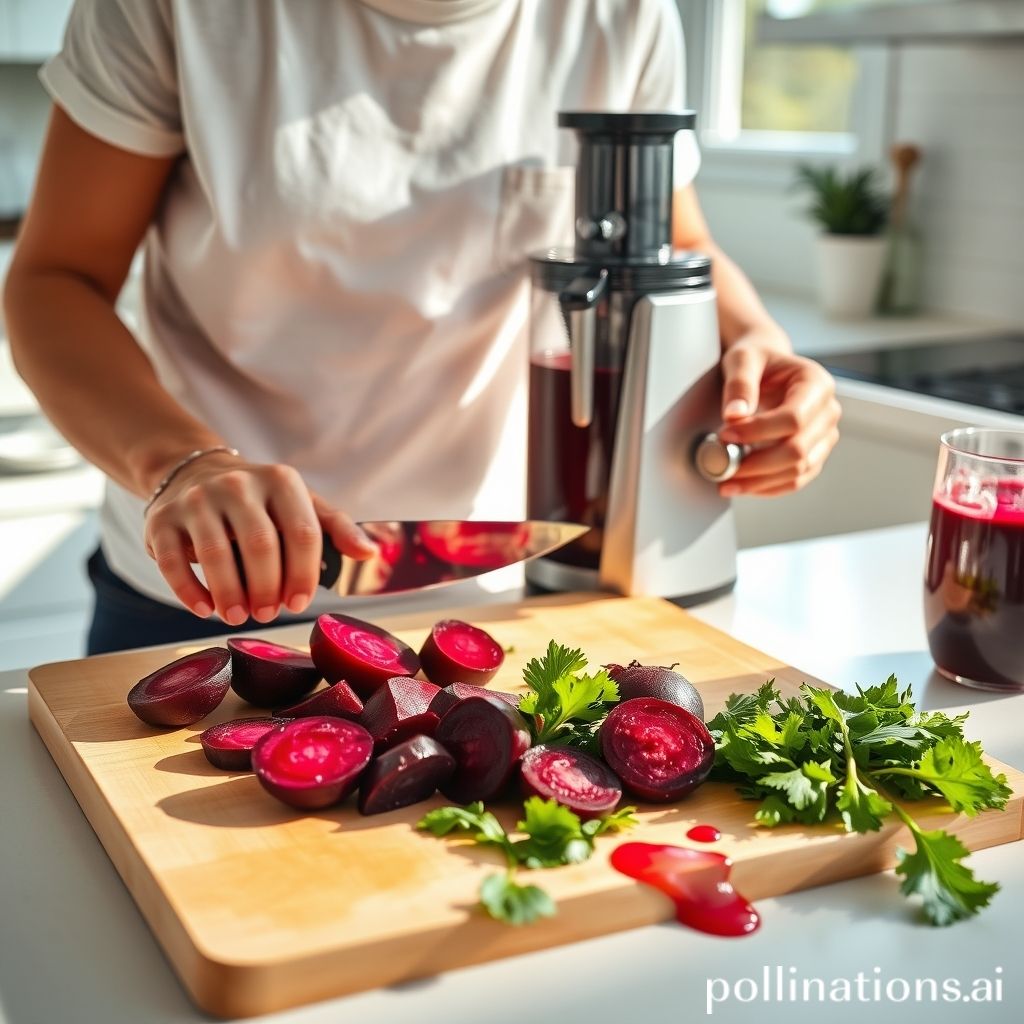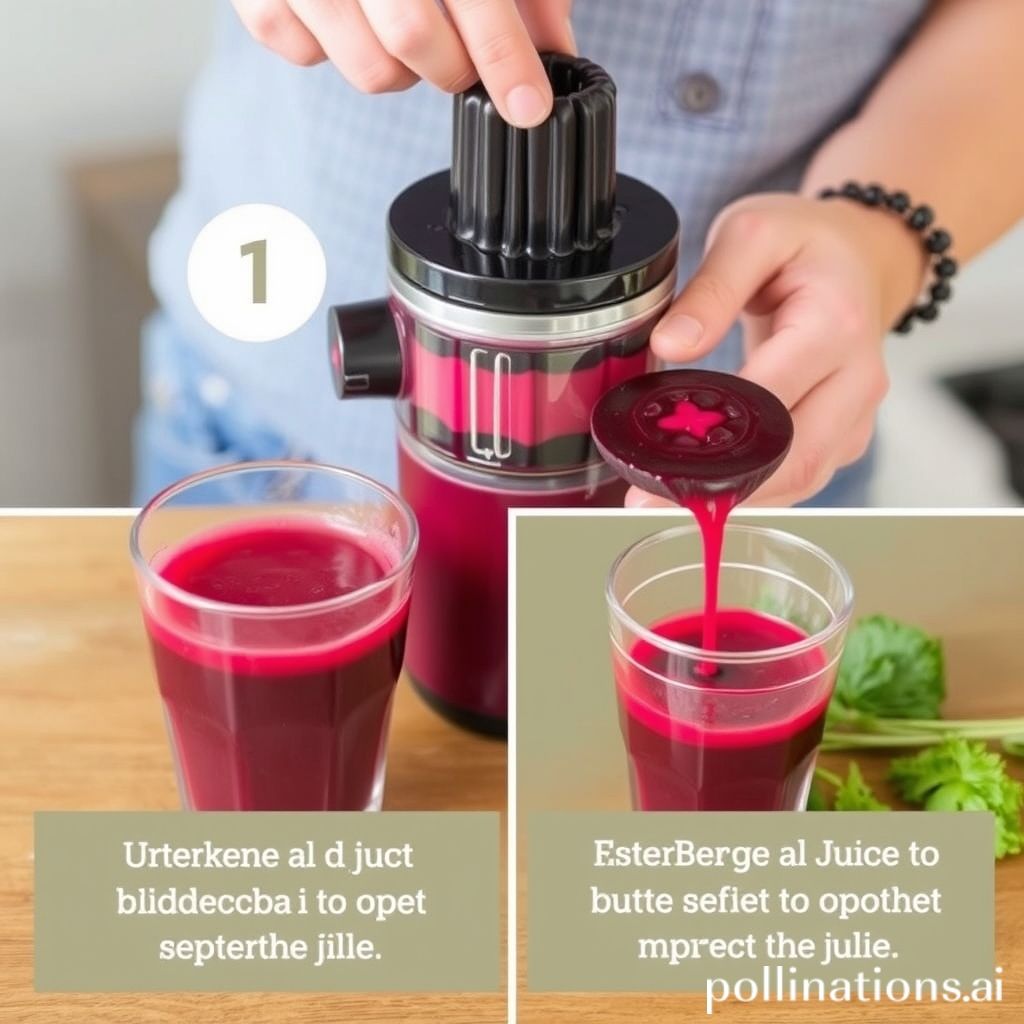How To Make Beet Juice?
[su_note note_color=”#fb8e00″ text_color=”#000000″ radius=”12″]
When we talk about beet juice, we’re talking about a vibrant drink that is not only delicious but also packed with essential nutrients. People all over the world are turning to beet juice as a way to enhance their health and well-being.
From athletes looking for a natural energy boost to individuals seeking to improve their cardiovascular health, beet juice has become a popular choice. In this guide, we will explore the step-by-step process of making beet juice and delve into the various benefits and variations of this nutritious beverage. So, if you’re ready to embark on a juicing adventure, let’s get started!
[su_box title=”
[/su_box]

Gathering the ingredients and equipment
To make beet juice, you need a few essential ingredients and equipment. Here’s a step-by-step guide to help you gather everything you need:
1. List of ingredients for beet juice
Before you start making beet juice, make sure you have the following ingredients:
- Beets: Choose fresh, organic beets for the best flavor and nutritional value. You can use red or golden beets based on your preference.
- Water: Use filtered or purified water to blend or juice the beets for the best taste.
- Optional ingredients: If you want to enhance the flavor of your beet juice, you can add ginger, lemon, or carrots. These add-ons provide additional health benefits and make the juice more refreshing.
2. Equipment required for juicing beets
To extract the juice from the beets, you need the following equipment:
- Juicer: A high-quality juicer is essential for making beet juice. Look for a juicer that can handle tough vegetables like beets and has a wide chute to accommodate whole beets.
- Knife and cutting board: Use a sharp knife and sturdy cutting board to prepare the beets for juicing. Make sure your knife can slice through beets effortlessly.
- Measuring cup: A measuring cup helps you determine the right amount of water to add to your beet juice, ensuring consistent taste and texture.
- Glass or jar: Once you’ve made your beet juice, store it in a glass or jar with an airtight seal to maintain freshness and prevent oxidation.
By gathering the necessary ingredients and equipment, you’re now ready to proceed with the next steps of making delicious and nutritious beet juice.
[su_highlight background=”#f6b40f”]Expert Tips: Choose fresh, organic beets for the best flavor and use a high-quality juicer to extract maximum juice.[/su_highlight]
Preparing the Beets
1. Cleaning and Peeling the Beets
Before making beet juice, it’s important to properly clean and peel the beets. Follow these steps:
- Clean the Beets: Rinse the beets under cool running water to remove dirt and debris. Gently scrub them with a vegetable brush.
- Peel the Beets: If desired, you can peel the beets to remove the outer skin. This step is optional as the skin is edible and contains nutrients. Peeling can help remove any dirt or pesticides. Use a vegetable peeler to carefully remove the skin.
2. Chopping the Beets into Smaller Pieces
Once the beets are cleaned and peeled, chop them into smaller pieces to make juice extraction easier. Follow these instructions:
- Choose the Size: Determine the size of the beet pieces based on your juicing equipment. For a powerful juicer, cut the beets into smaller chunks. For a less powerful juicer, cut them into smaller, more manageable pieces.
- Cut the Beets: Use a sharp knife and cutting board to slice the beets into the desired size. Ensure the pieces are uniform for even juicing.
| Benefits of Preparing Beets | Variations of Beet Juice |
|---|---|
| – Nutrient Retention: Cleaning the beets removes impurities, ensuring maximum nutrient intake from the juice. | – Mixing with Other Fruits and Vegetables: Experiment with different combinations of fruits and vegetables to create unique beet juice flavors. Popular variations include adding apple, carrot, ginger, or lemon. |
| – Improved Taste: Peeling the beets enhances the juice’s taste by eliminating bitter flavors. | – Adding Herbs and Spices: To add depth to your beet juice, incorporate herbs and spices like mint, basil, cinnamon, or turmeric. |
| – Safety: Cleaning and peeling the beets ensures the removal of potential contaminants, making the juice safe to consume. | – Adjusting Sweetness: Customize the sweetness of your beet juice by adding natural sweeteners like honey or maple syrup according to your preference. |
Extracting Beet Juice
1. Using a Juicer to Extract Beet Juice
Beet juice can be easily extracted using a juicer, which is efficient and convenient. Follow these steps to make beet juice using a juicer:
- Prepare the beets: Wash the beets thoroughly to remove dirt and debris. Trim off the leafy tops and bottom root.
- Cut into smaller pieces: Cut the beets into small, manageable pieces that fit into the juicer chute.
- Feed the beets into the juicer: Turn on the juicer and gradually feed the beet pieces into the chute.
- Collect the juice: Place a container under the juicer spout to collect the extracted beet juice.
- Strain the juice (optional): If desired, strain the beet juice through a fine-mesh sieve or cheesecloth to remove pulp or solids.
2. Alternatives to Using a Juicer for Beet Juice Extraction
If you don’t have a juicer or prefer alternative methods, there are other ways to extract beet juice:
- Blender method: Peel and chop the beets into smaller pieces. Add the beet pieces to a blender with a small amount of water. Blend until smooth, then strain the mixture to separate the juice from the pulp.
- Hand-juicing: Peel the beets and cut them into small chunks. Use a citrus juicer or manual juicer to squeeze out the juice.
- Grating method: Grate the beets using a box grater or food processor. Once grated, place the beets in a cheesecloth or nut milk bag and squeeze out the juice.
Experiment with different methods to find the one that suits your preferences and available equipment. Enjoy the process of making your own fresh and nutritious beet juice!

Enhancing the Flavor and Nutritional Value
1. Adding Other Fruits and Vegetables to Beet Juice
One way to enhance the flavor and nutritional value of beet juice is by adding other fruits and vegetables. This not only adds a variety of flavors but also increases the overall nutrient content of the juice.
- Citrus Fruits: Adding citrus fruits like oranges or lemons can provide a tangy taste and boost the vitamin C content of the juice.
- Apples: Including apples can add a hint of sweetness and also increase the fiber content.
- Carrots: Mixing in carrots can enhance the earthy flavor and provide additional vitamins and antioxidants.
2. Incorporating Herbs and Spices for Added Benefits
Another way to enhance the flavor and nutritional value of beet juice is By coalescing herbs and spices. These additions not only bring a burst of flavor but also offer various health benefits.
- Ginger: Adding ginger can provide a spicy kick and help with digestion and reducing inflammation.
- Mint: Mint leaves can add a refreshing taste and aid in digestion.
- Cinnamon: Sprinkling some cinnamon can add warmth and may help regulate blood sugar levels.
Experimenting with different herbs and spices allows you to customize your beet juice according to your taste preferences and health goals.
| Information |
|---|
| Beet juice can be enhanced by adding various fruits, vegetables, herbs, and spices. |
| Adding citrus fruits like oranges or lemons can boost the vitamin C content. |
| Apples add sweetness and fiber to the juice. |
| Carrots enhance the earthy flavor and provide additional nutrients. |
| Ginger, mint, and cinnamon are herbs and spices that can add flavor and health benefits. |
[su_note note_color=”#ea2e0c” text_color=”#ffffff” radius=”8″]Extra Tips: Transform your beet juice by adding citrus fruits, apples, carrots, ginger, mint, or cinnamon for enhanced flavor and health benefits.[/su_note]
Storing and Serving Beet Juice
1. Proper storage methods for beet juice
Properly storing beet juice is important to maintain its freshness and nutritional value. Follow these tips to store your homemade beet juice:
- Refrigerate: After juicing, transfer the beet juice to an airtight glass container and refrigerate it immediately. This slows down oxidation and extends the juice’s shelf life.
- Use dark-colored containers: Store beet juice in dark-colored glass containers to block light and prevent nutrient degradation.
- Fill the container: Fill the container to the brim to minimize air exposure and oxidation, preserving the vibrant color and flavor of the juice.
- Consume within 48 hours: Beet juice is highly perishable, so it’s best to consume it within 48 hours to retain its freshness and nutritional benefits. After this time, the juice may lose color and some nutrients.
2. Tips for serving beet juice
Serving beet juice can be enjoyable. Here are some tips to enhance its presentation and taste:
- Chill before serving: Chill the beet juice in the refrigerator before serving to enhance its refreshing taste. You can also add ice cubes for extra refreshment on hot days.
- Add a twist of citrus: Squeeze a splash of lemon or lime juice into the beet juice to add tanginess and balance the earthy flavor of the beets.
- Garnish creatively: Enhance the visual appeal of your beet juice by garnishing it with mint, orange slices, or berries. This adds color and complements the flavors.
- Pair with complementary ingredients: Experiment with different flavor combinations by mixing beet juice with fruits or vegetables like apples, carrots, or ginger. This creates unique and delicious juice blends.
Conclusion
Making beet juice is a simple and rewarding process. By embracing a step-by-step guide or recipe, you can easily extract the juice from beets and enjoy the numerous benefits of this healthy beverage.
Whether you prefer it plain or with added variations, beet juice is a refreshing way to incorporate more nutrients into your diet. So why not give it a try and start enjoying the delicious and nutritious benefits of homemade beet juice?
Frequently Asked Questions about Making Beet Juice
FAQ 1: Can I drink beet juice every day?
Yes, you can drink beet juice every day. Nevertheless, it is recommended to consume it in moderation. Drinking 1 to 2 cups of beet juice per day is generally considered safe and can provide numerous health benefits.
FAQ 2: How long does beet juice last in the refrigerator?
When properly stored, beet juice can last for up to 3-5 days in the refrigerator. It is important to keep it in an airtight container to maintain its freshness and prevent bacterial growth.
FAQ 3: Can I freeze beet juice?
Yes, you can freeze beet juice. Freezing helps to extend its shelf life for up to 6 months. It is recommended to store it in an airtight container or a freezer-safe bag to prevent freezer burn and maintain its quality.
FAQ 4: Can I use cooked beets to make juice?
Yes, you can use cooked beets to make juice. At the same time raw beets are commonly used for juicing, cooked beets can also be used. Nevertheless, keep in mind that cooking may slightly alter the taste and nutritional content of the juice.
FAQ 5: Are there any potential side effects of drinking beet juice?
At the same time beet juice is generally safe for consumption, it may cause some side effects in certain individuals. These may include temporary discoloration of urine or stool, stomach upset, or low blood pressure. If you have any existing health conditions or concerns, it is recommended to consult with a healthcare professional before incorporating beet juice into your diet.
